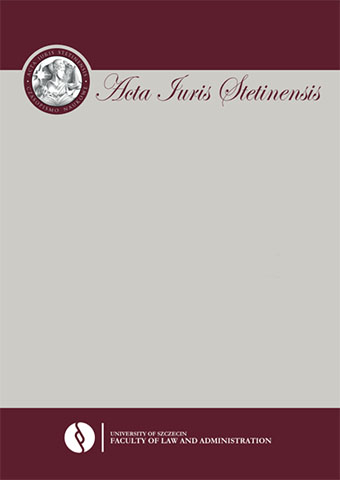| 1. | Almer, C., Extending the economic model of crime to environmental offenses - and vice versa, https://www.ethz.ch/content/dam/ethz/special-interest/mtec/cer-eth/resour- ce-econ-dam/documents/research/ws-and-conf/nachwuchsworkshop/Almer_Paper. pdf. |
| 2. | Ashraf, N. et al., Adam Smith. Behavioral economist, “Journal of Economic Perspective” 2005, Vol. 19, No. 3. |
| 3. | Barrett, J.J., Sentencing environmental crimes under the United States sentencing guide- lines: a sentencing lottery, “Environmental Law” 1992, No. 22. |
| 4. | Becker, G.S., Crime and punishment: an economic approach, “Journal of Political Econo- my” 1968, Vol. 76, No. 2. |
| 5. | Becker, G.S., Irrational behaviour and economic theory, “Journal of Political Economy” 1962, Vol. 70, No. 11-13. |
| 6. | Bentham, J., Introduction to the principles of morals and legislation, Kitchener 2000, https://socialsciences.mcmaster.ca/econ/ugcm/3ll3/bentham/morals.pdf. |
| 7. | Bowles, R., Law and the economy, Oxford 1982. |
| 8. | Coffee, J.S., Corporate crime and punishment: a non-Chicago view of the economics of cri¬minal sanctions, “American Criminal Law Review” 1980. |
| 9. | Cooter, R., Prices and sanctions, “Columbia Law Review” 1984. |
| 10. | Cooter, R. and Ulen, T., Law and economics, 6th edition, Berkeley 2016. |
| 11. | Faure, M., Environmental crimes, in: Garoupa, N. (ed.), Criminal law and economics, Cheltenham 2009. |
| 12. | Gruszecka, D., Komentarz do art. 182, in: Giezek, E. (ed.), Kodeks karny. Część szczegól¬na. Komentarz, Warszawa 2014. |
| 13. | Gałązka, M., Komentarz do art. 182, in: Grześkowiak, A. and Wiak, K. (eds.), Kodeks kar¬ny. Komentarz, Warszawa 2019. |
| 14. | Jajuga, W., in: Jajuga, W. (ed.), Zarządzanie ryzykiem, Warszawa 2007. |
| 15. | Królikowski, M., Komentarz do art. 183 in: Królikowski, M. and Zawłocki, R. (eds.), Ko¬deks karny. Część szczególna. Tom I. Komentarz do artykułów 117-221, 2017, Legalis. |
| 16. | Kurowski, M., Komentarz do art. 5, in: Świecki, D. (ed.), Kodeks postępowania karnego. Tom I. Komentarz, 2020, LEX. |
| 17. | Lachowski, J., Komentarz do art. 182, k.k., in: Konarska-Wrzosek, V. (ed.), Kodeks karny. Komentarz, 2018, LEX. |
| 18. | Miceli, T., Optimal prosecution of defendants whose guilt is uncertain, “Journal of Law, Economics and Organisation” 1990, No. 6. |
| 19. | Meinberg, V., Empirische Erkenntnisse zum Vollzug des Umweltstrafrechts, “Zeitschrift fur die Gesamte Strafrechtswissenschaften” 1988. |
| 20. | Ogus, A. and Abbot, C., Pollution and penalties, in: Swanson, T. (ed.), An introduction to the law and economics of environmental policy: issues in institutional design, Am¬sterdam 2002. |
| 21. | Polinsky, M. and Shavell, S., The economic theory of public enforcement of law, “Journal of Economic Literature” 2000, No. 38. |
| 22. | Posner, R., An economic theory of the criminal law, “Columbia Law Review” 1985, No. 85. |
| 23. | Posner, R., Frontiers of legal theory, Harvard 2004. |
| 24. | Posner, R., Optimal sentences for white-collar criminals, “American Criminal Law Re- view” 1980, Vol. 17. |
| 25. | Radecki, W., Ochrona środowiska w nowym prawie karnym, cz. II: Prawnokarna ochrona przed zanieczyszczeniami, odpadami i promieniowaniem, “Monitor Prawniczy” 1998, No. 1, Legalis. |
| 26. | Radecki, W., Komentarz do art. 182 k.k., in: Górniok, O. (ed.), Kodeks karny. Komentarz, Warszawa 2005. |
| 27. | Radecki, W., Komentarz do art. 191, in: Radecki, W. (ed), Ustawa o odpadach. Komen¬tarz, Warszawa 2012. |
| 28. | Shavell, S., Criminal law and the optimal use of non-monetary sanctions as a deterrent, “Columbia Law Review” 1985, No. 85. |
| 29. | Skogh, G., A note on gary becker’s crime and punishment: an economic approach, “Swe- dish Journal of Economics” 1973, Vol. 75. |
| 30. | Skogh, G. and Stuart, C., An economic analysis of crime rates, punishment and the social consequences of crime, “Public Choice” 1982, No. 38. |
| 31. | Stigler, G., The optimum enforcement of laws, “Journal of Political Economy” 1970, Vol. 78, No. 3. |
| 32. | Zoll, A., Komentarz do art. 182, in: Wróbel, W. and Zoll, A. (eds.), Kodeks karny. Część ogólna. Tom I. Część I. Komentarz do art. 1-52, 2016, LEX. |







